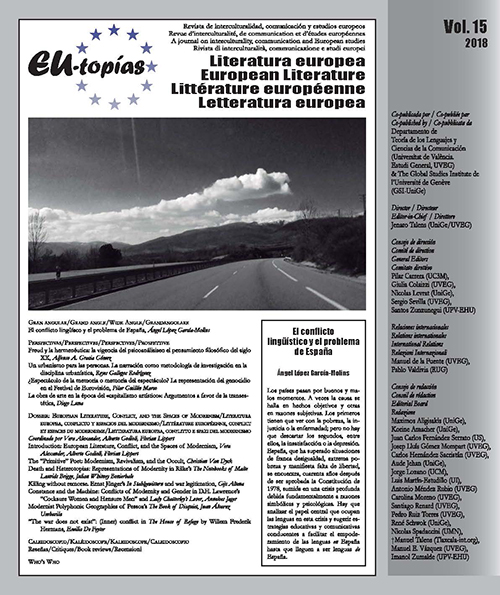Killing without Remorse Ernst Jünger’s In Stahlgewittern and War Legitimation
DOI:
https://doi.org/10.7203/eutopias.0.18579Keywords:
Junger, In Stahlgewittern, Marxism, war, false consciousness, storm Abstract
Abstract
Discussing the role of war and what in Marxist theory is called false consciousness, this article strives to create a better understanding of how the individual in war can be led to kill without remorse, even though the human empathic faculty should prevent this. By delving deeper into the history of the war novel in the interwar period, this article highlights the main theories of war legitimation, whilst showing that In Stahlgewittern, Ernst Ju?nger’s controversial account of First World War, does not fit into any of these theories. Based on a comparison of In Stahlgewittern with Der Friede, another of Ju?nger’s texts, and the historical use of the storm-motif in literature, it is concluded that Ernst Ju?nger tries to legitimate his deeds by putting them in a theological-apocalyptic framework.
 Downloads
Downloads
 References
References
Alphen, Hieronymus van (1998), Kleine Gedigten voor kinderen, Piet Buijnsters (ed.), Amsterdam: Polak & Van Gennep.
Bellamy, Jacobus (1838), Gezangen, Dordrecht: P. Los.
Büchner, Georg (1980), Werke und Briefe, Karl Pörnbacher et al. (ed.), Munich: dtv klassik.
Horváth, Ödön von (2001), Ein Kind unserer Zeit, Traugott Krischke (ed.), Frankfurt: Suhrkamp.
Jünger, Ernst (1992), “Der Friede”, Paul Michael Lützeler (ed.), Die Schriftsteller und Europa. Von der Romantik bis zur Gegenwart, München & Zürich: Piper, pp. 328-365.
Jünger, Ernst (2014), In Stahlgewittern, Stuttgart: Klett-Cotta.
Lenz, Jakob Michael Reinhold (1992), “Über die Soldatenehen”, Werke und Briefe. Band 2: Prosa, Sigrid Damm (ed.),Frankfurt am Main: Insel Verlag, pp. 787-827.
Milton, John (2005), Paradise Lost, Gordon Teskey (ed.), New York & London: Norton.
Remarque, Erich Maria (2014), Im Westen nichts Neues, Thomas F. Schneider (ed.), Köln: Kiepenheuer & Witsch.
Weisse, Christian Felix (1763), Scherzhafte Lieder, Leipzig: M.G. Weidemanns Erben und Reich.
Downloads
Published
How to Cite
-
Abstract514
-
PDF64
Issue
Section
License
![]()
The authors conserve the copyright. All content published in EU-topías. Journal of interculturality, Communication, and European Studies are subject to the license Creative Commons Attribution-NonCommercial-ShareAlike 4.0 license. The full text of the license can be found at <http://creativecommons.org/licenses/by-nc-sa/4.0>
They may be copied, used, disseminated, transmitted and publicly displayed, provided that:
- The authorship and original source of the publication is cited (journal, publisher and URL of the work).
- They are not used for commercial purposes.
- The existence and specifications of this license of use are mentioned.
It is the responsibility of the authors to obtain the necessary permissions for images that are subject to copyright.



